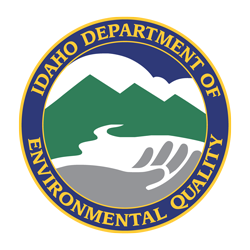Idaho businesses are required to track the amount of generated waste, determine if any waste is hazardous, and ensure that all wastes are disposed of according to federal, state, and local requirements. The following are common wastes generated at businesses:
Universal wastes are hazardous wastes commonly generated by business and industry. Universal Waste Rule allows certain hazardous wastes to be managed under streamlined requirements. The rule is designed to encourage recycling and proper disposal of some common hazardous wastes and reduce the regulatory burden on businesses that generate these wastes. The universal waste rule is optional and businesses may opt to manage these wastes as hazardous wastes instead. Universal wastes include certain types of batteries, light bulbs, mercury-containing devices, and pesticides. Learn more about universal waste.
A solvent is considered spent when it has been used, and due to contamination, can no longer serve its intended purpose. Examples include mineral spirits, chlorinated solvents, paint-related waste, and alcohol that is no longer useful. Depending on their content, spent solvents may be hazardous wastes.
This accordion will not appear on the screen
Regulated spent solvents may be recycled for reuse at the generator’s facility, off-site, or at a permitted hazardous waste treatment, storage, and disposal facility (TSDF). DEQ recommends that businesses recycle as much spent solvent as possible.
Spent solvents that are hazardous count towards a facility’s generator size. The method for counting solvents depends on whether the generator recycles the solvent or not.
Learn more about Counting Spent Solvents to Determine Generator Status.
Parts washers are commonly used in manufacturing or maintenance. Cleaning solutions used in parts washers include solvents and water-based cleaners. Generators are required to determine if the spent parts washer cleaning solution is hazardous waste and ensure it is properly managed.
Learn more about Properly Managing Parts Washer Waste.
Solvent-contaminated wipes and rags may be disposed of or laundered on-site or sent to a regulated commercial laundering facility. The regulations for solvent-contaminated wipes depend on how they are managed.
Learn more about the regulations that apply to solvent-contaminated wipes and rags: Solvent Contaminated Wipes Summary Chart.
Air drying solvent-contaminated wipes and rags to allow volatile constituents to evaporate is prohibited.
Environmental concerns have made traditional solvents and cleaning processes increasingly regulated and expensive. DEQ encourages businesses to consider switching to safer, less toxic alternative products or processes when possible.
Reduce solvent use and exposure to solvent vapors by keeping containers closed and minimizing the chance of spills and leaks.
See DEQ’s Pollution Prevention program for assistance.
A sump is a pit or tank that catches liquid runoff before entering a sanitary sewer system. Sump waste is the mixture of dirt, grime, and grit that accumulates in a sump. Owners and operators of facilities that generate solid waste are required to determine whether wastes are hazardous before disposing of them. Facilities with sumps must determine if the contents are hazardous before disposal.
Learn more about Managing Sump Waste.
Electronic waste or e-waste includes unwanted, obsolete, or unusable electronic products such as computers and tablets, televisions, DVD players, stereo equipment, and cell phones. E-waste takes up valuable landfill space and can contain hazardous materials such as lead. When disposed of improperly, e-waste can adversely impact human health and the environment.
Businesses have the option of donating or recycling e-waste. When these options are not available, businesses must follow applicable hazardous waste regulations in the “Rules and Standards for Hazardous Waste” (IDAPA 58.01.05).
This accordion will not appear on the screen
Many charities, schools, and other organizations need equipment. Donating used electronics extends the lifespan of the products while providing valuable resources to organizations in need. To take advantage of the reduced regulatory burden provided through donation, businesses must ensure that recipients are legitimately reusing or recycling electronic materials.
Recycling conserves natural resources by reusing the plastics, metals, and other parts used in electronics. There are many national and regional recycling programs for used electronics and accessories. To take advantage of the reduced regulatory burden provided by recycling, businesses must ensure that the recycling programs they utilize are legitimately recycling the materials.
Some electronic wastes are considered hazardous due to heavy metal components such as lead. If donation or recycling options are not available, businesses must determine if their electronics are hazardous waste and manage them according to the hazardous waste regulations in IDAPA 58.01.05.
See Hazardous Waste Determinations for more information.
Visit EPA’s Sustainable Materials Management of Electronics program to learn more about electronic stewardship and efforts to reduce the impact of electronic waste on the environment.
Businesses that generate pharmaceutical wastes must determine if they are hazardous and manage them accordingly. In 2019, EPA promulgated a new rule for managing hazardous waste pharmaceuticals from healthcare facilities and reverse distributors, and Idaho incorporated the rule in spring 2021.
Use the following resources to learn more about pharmaceutical hazardous wastes:
- Managing Hazardous Waste Pharmaceuticals video (February 6, 2024)
- The new 40 CFR 266 Subpart P standards in our storymap
- Example Hazardous Waste Pharmaceuticals
- Pharmaceutical Sewer Ban
Generators who are not healthcare facilities or reverse distributors as defined in the new rule, such as pharmaceutical manufacturers, are subject to the generator requirements of 40 CFR 262 when managing hazardous waste pharmaceuticals.
Resources
This accordion will not appear on the screen
Hazardous Waste Bureau Chief
Hazardous Waste Compliance and Enforcement Supervisor

